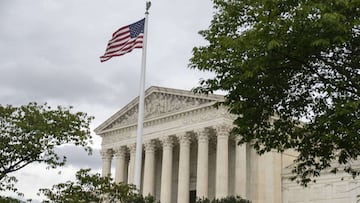What is the new abortion law in Texas?
Texas has introduced a restrictive new abortion law after a legal loophole allowed the Republican legislature to incentivise citizens to file suits against abortion clinics.


Late on Wednesday night the Supreme Court blocked a last-ditch attempt to prevent a new law coming into force in Texas which will ban abortions beyond six weeks, the harshest restrictions anywhere in the country.
In a 5-4 vote the three Trump-appointed justices joined with two other conservative members of the Court to rule that abortions rights groups had not properly addressed the "complex and novel antecedent procedural questions" involved.
The new ban could see those accused to have helped a women in receiving an abortion hit with a fine of more than $10,000, threatening the existence of abortion clinics in the state entirely.
How was the new Texas abortion law passed?
The legislation is known as Senate Bill 8 and was pushed through the Republican-led Texas state legislature before being signed into law by GOP Gov. Greg Abbott in May. It is a new interpretation of the ‘heartbeat bills’ that are often forwarded by anti-abortion groups in order to prevent abortions once embryonic cardiac activity is detected.
A heartbeat typically occurs just six weeks into pregnancy, at which point the majority of women are not even aware that they are pregnant. A study from the University of Texas found that the strict new restrictions would prevent around 85% of women from receiving access to abortion care. There is no exceptions offered in instances of rape or incest.
Sen. Warren on the Texas abortion law: "This is why Congress should step up. Let's remember that 70% of Americans want to see Roe v. Wade as the law of the land. The Supreme Court is not the only one who could provide that. Congress could pass Roe v. Wade." pic.twitter.com/sBq54DrqVN
— MSNBC (@MSNBC) September 1, 2021
The new legislation would seem to fly in the face of the precedent established by Roe v. Wade in 1973 but the Texas legislature has attempted to circumvent that ruling by incentivising private citizens to bring civil suits. Under the new law, individuals who suspect that someone is aiding or abetting a women getting an abortion after six weeks in the state of Texas can sue them in civil courts for a minimum of $10,000.
This reversal is designed to insulate Texas officials from legal challenges that would occur if they attempted to enforce the law, while providing an incentive for Texans to inform on clinics and individuals.
Supreme Court refuses to block the Texas abortion ban
The Supreme Court’s decision to allow the ban to coming into force is a significant one for the future of abortion rights in the United States, but did leave plenty of scope for further challenges to the law. The five justices who voted to allow the ban to stand stressed that their ruling was not based on the constitutionality of the law and provided a joint statement saying that they would hear any “procedurally proper challenges” to it.
The four dissenting justices all filed individual opinions on the Court’s decision, decrying the majority’s decision to yet the ban stand.
By a 5–4 vote, the Supreme Court just allowed Texas to enforce a law that prohibits abortions after six weeks, with no exception for rape or incest. Roe v. Wade is, functionally, overturned. Justice Sotomayor all but says it. https://t.co/elazEg3xdZ pic.twitter.com/KOSJZRIUMk
— Mark Joseph Stern (@mjs_DC) September 2, 2021
Related stories
Justice Sonia Sotomayor described the ban as “a flagrantly unconstitutional law engineered to prohibit women from exercising their constitutional rights and evade judicial scrutiny,” slamming those on the court who had “opted to bury their heads in the sand.”
Chief Justice John Robert was the sole conservative voice to join in dissention and he issued a clear signal that there was judicial recourse for those looking to challenge the law. He said that the “statutory scheme before the court is not only unusual, but unprecedented,” arguing that it appeared designed to “insulate the state from responsibility for implementing and enforcing the regulatory regime.”

